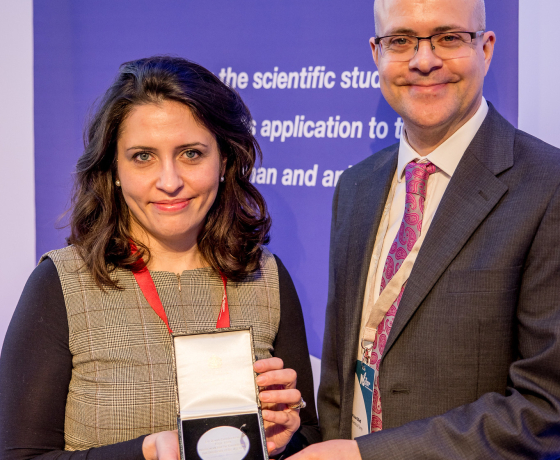
Cuthbertson Award
The Nutrition Society Cuthbertson Award has been awarded annually since 1990 as a tribute to Sir David Cuthbertson.
It is awarded to scientists or clinicians at an early stage of their career for excellence in clinical nutrition and/or metabolism research providing an evidence base for clinical practice.
Applications have closed for 2025 and will open again in Autumn 2026.
What will I be awarded?
The successful candidate will be awarded free membership of the Nutrition Society for one year, will receive an award and present their research during the Nutrition Society Winter Conference (the topic of your presentation submission does not need to be linked to the topic of the conference), and be invited to prepare a paper for publication in the Proceedings of the Nutrition Society (PNS).
Am I eligible?
Applicants for this prestigious award should be scientists or clinicians within 15 years of higher degree graduation at application. The work should be of clear relevance to nutritional management in patient care. Research related to the epidemiology and prevention of disease, i.e. public health nutrition, are not eligible.
Applicants must be Nutrition Society members.
Re-applications will be considered.
Applications will be judged by acknowledged experts in the field.
Work will be assessed for:
1. Relevance to the terms of reference
2. Quality and impact of the submission
3. Publication record
4. Evidence of independent scholarship
5. Future potential
- 1990, J.N. Alastair Gibson, Department of Orthopaedic Surgery, University of Edinburgh and Department of Anatomy & Physiology, University of Dundee, UK, The effects of injury and joint disease on muscle mass and protein turnover
- 1991, Kenneth C.H. Fearon, University Department of Surgery, Royal Infirmary of Edinburgh, UK,The mechanisms and treatment of weight loss in cancer
- 1992, Kenneth G.M. Park, The Department of Surgery, Aberdeen University and The Rowett Research Institute, Aberdeen, UK, The immunological and metabolic effects of L-arginine in human cancer
- 1993, Jeremy M.D. Nightingale, Department of Gastroenterology, St Mark's Hospital, London, UK, Clinical problems of a short bowel and their treatment
- 1994, Timothy E. Bowling, Department of Gastroenterology and Nutrition, Central Middlesex Hospital, London, UK, Enteral-feeding-related diarrhoea: proposed causes and possible solutions
- 1995, Philip C.Calder, Department of Biochemistry, University of Oxford, Oxford, UK, Immunomodulatory and anti-inflammatory effects of n-3 polyunsaturated fatty acids
- 1996, Susan A, Jebb, MRC Dunn Clinical Nutrition Centre, Addenbrooke's Hospital, Cambridge, UK, Energy metabolism in cancer and human immunodeficiency virus infection
- 1997, Derek C. Macallan, Division of Infectious Diseases, St. George's Hospital Medical School, London, UK, Metabolic abnormalities and wasting in human immunodeficiency virus infection
- 1998, Mark J. Holness, Molecular and Cellular Biology, Division of Biomedical Sciences, St Bartholomew’s and the Royal London School of Medicine and Dentistry, Queen Mary and Westfield College, London, UK, The impact of dietary protein restriction on insulin secretion and action
- 1999, Jas S. Samra, Department of Surgery, Royal North Shore Hospital, Australia, Regulation of lipid metabolism in adipose tissue
- 2000, Gordon L. Carlson, Department of Surgery, Hope Hospital, Salford, UK, Insulin resistance and glucose-induced thermogenesis in critical illness
- 2001, John J. Reilly, University of Glasgow Department of Human Nutrition, Royal Hospital for Sick Children, Glasgow, UK, Understanding chronic malnutrition in childhood and old age: role of energy balance research
- 2002, Simon Eaton, Surgery Unit and Biochemistry, Endocrinology and Metabolism Unit, Institute of Child Health (University College London), London UK, Impaired energy metabolism during neonatal sepsis: the effects of glutamine
- 2003, Dileep Lobo, Section of Surgery, University Hospital, Queen's Medical Centre, Nottingham, UK, Fluid, electrolytes and nutrition: physiological and clinical aspects
- 2004, Rebecca Stratton, Institute of Human Nutrition, School of Medicine, University of Southampton, Southampton General Hospital, Southampton, UK, Elucidating effective ways to identify and treat malnutrition
- 2005, Gema Fruhbeck, Department of Endocrinology and Metabolic Research Laboratory, Clínica Universitaria de Navarra, University of Navarra, Pamplona, Spain, Hunting for new pieces to the complex puzzle of obesity
- 2006, M Denise Robertson, School of Biomedical and Molecular Sciences, University of Surrey, UK, Metabolic cross talk between the colon and the periphery: implications for insulin sensitivity
- 2007, Helen Budge, Academic Division of Child Health, School of Human Development, University Hospital, Nottingham, UK
- 2008, Carel W le Roux, Department of Metabolic Medicine, Hammersmith Hospital, Imperial College London, UK, Gut hormone profiles following bariatric surgery favor an anorectic state, facilitate weight loss, and improve metabolic parameters
- 2009, No Winner
- 2010, Barbara Fielding, Oxford Centre for Diabetes, Endocrinology and Metabolism, Churchill Hospital, Oxford, UK and Postgraduate Medical School, University of Surrey, Guildford, UK, Tracing the fate of dietary fatty acids: metabolic studies of postprandial lipaemia in human subjects
- 2011, Professor David S Sanders, Department of Gastroenterology, Royal Hallamshire Hospital, Sheffield, UK, Emerging concepts: from coeliac disease to non-coeliac gluten sensitivity
- 2012, Dr Kevin Whelan, King's College London, UK, Interaction between the microbiota and dietary carbohydrates in the management of gastrointestinal disease
- 2013, Professor Maria O'Sullivan, Trinity College Dublin, Ireland, Evidence for Vitamin D as a novel anti-inflammatory therapy - a ray of hope or false dawn
- 2014, Dr Alexander Miras, Imperial College London, UK, Food reward after bariatric surgery
- 2015, Dr James Betts, University of Bath, UK, The Science Behind Breakfast
- 2016, Dr Sinead Duggan, Trinity College Dublin, Chronic pancreatitis: Negotiating the complexities of clinical nutrition in exocrine and endocrine dysfunction
- 2017, Professor Leanne Hodson, University of Oxford, Hepatic fatty acid synthesis and partitioning: the effect of metabolic and nutritional state.
- 2018, Cuthbertson Award not awarded
- 2019, Dr Aoife Ryan, University College Cork, Impact of musculoskeletal degradation in cancer and strategies for management in clinical practice.
- 2020, Dr Richard JE Skipworth, Royal Infirmary of Edinburgh, for his research entitled ‘Muscle and fat wasting in cachexia: the metabolic response to cancer’ .
- 2021, Dr Nerys Astbury, Nuffield Department of Primary Care Health Sciences, University of Oxford for her research on Low-energy total diet replacement weight loss programmes- from bench to bedside.
- 2022, Dr Giovanna Muscogiuri, University of Naples Federico II, Italy, for her research on 'Nutrition and metabolic diseases: also clock matters?'.
- 2023, Dr Eirini Dimidi, King's College London, UK, for her research on 'Diet and the gut: establishing treatments, tackling trends, and improving patient care'.
- 2024, Dr Elena George, Deakin University, Australia, for her research on 'Accessible multimodal lifestyle interventions for people with fatty liver disease, bringing together diet, physical activity and sleep while considering sociocultural adaptations- Can we do it all?'.
How to apply
Applicants for the award must supply:
- A brief up to date curriculum vitae
- A 1000 word summary of their contribution to an area of relevance to clinical nutrition and/or metabolism
- An abstract summary of the proposed lecture at the Nutrition Society Winter Conference
- Copies of up to three published papers in support of their application
- The names, addresses and emails of three Proposers who are familiar with the applicant’s work and who will support the application
